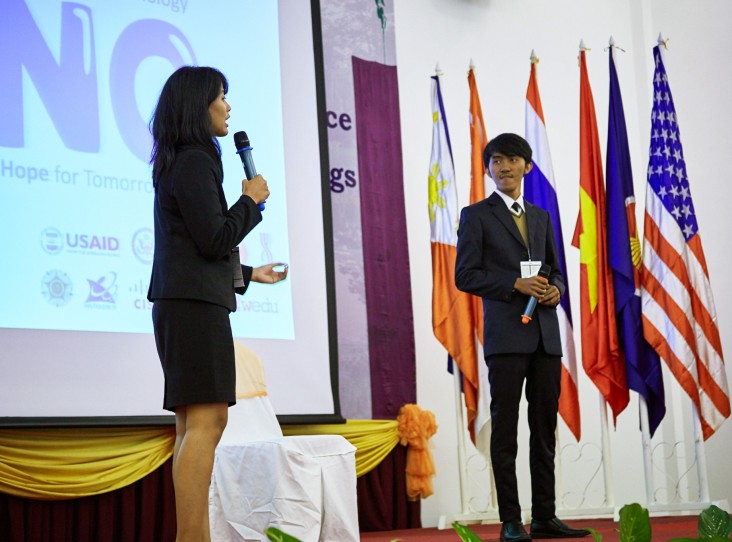
SIEM REAP, October 31, 2016 – The United States and the Association of Southeast Asian Nations (ASEAN) awarded first place of the Young Southeast Asian Leaders Initiative (YSEALI) World of Food Innovation Challenge to a team of three Indonesian students from Gadjah Mada University. The team’s MINO Microbubble Generator technology increased oxygen in water and as a result, enlarged tilapia fish size by 40 percent, improved fish survival rate by nine percent, and ultimately increased tilapia fish farmers’ harvest.
“We believe this system will not only increase the welfare of fish farmers, but will also create job opportunities in other sectors, as well as improve food security locally, internationally, and regionally,” said Untari Febrian Ramadhani, one of the three students who are part of the MINO Team.
Members of the ASEAN Committee on Science and Technology, gathered in Siem Reap, Cambodia for their annual meeting with the United States, selected Muhammad Nabil Satria Faradis, Fajar Sidik Abdullah, and Untari Febrian Ramadhani as the winners. These students will take part in a study trip to Austin, Texas, one of the main technology hubs in the United States, in March 2017.
Institute of Technology of Cambodia took second place with their Cam Fermentation Kits. Team members Panhchapor Chhim, Seyha Doeurn and Sereyvuth Thai, with their advisor Dr. Reasmey Tan, developed a solution to improve quality and sanitation in cucumber pickling. The fermentation kits include an optimum fermentation tank and a bio-degradable seal.
INTI International University in Malaysa took third place honors for iSEA Forces. Team members How Ming Tan, Zien Lew and Nur Syafiyah Nabilah bt Arman, with support from their advisor, Assoc. Prof Wong Ling Shing, developed this app as a management tool, an interactive forum, a one-stop marketplace and a dictionary for fishermen in Malaysia and elsewhere in the region.
“The United States is proud to support young people in ASEAN who are developing innovative technology solutions to some of the region’s most complex challenges around food,” said Ambassador Nina Hachigian. “The Innovation Challenge demonstrates that when we equip young people with the right technological tools to innovate – incredible ideas and solutions flourish.”
The Innovation Challenge, implemented by the U.S Agency for International Development in partnership with technology giants Cisco and Intel, invited youth from across ASEAN Member Nations to propose technology-based solutions to address some of the region’s most daunting challenges in the fields of agriculture, aquaculture, and fisheries. More than 200 applications were received from Cambodia, Indonesia, Laos, Malaysia, Myanmar, Philippines, Thailand, and Vietnam.
President Obama launched the Innovation Challenge in February 2016 as part of the U.S government’s initiative for engaging youth in Southeast Asia. The Innovation Challenge is one of the many U.S. initiatives in support of ASEAN and its ten Member States.
The U.S. partners with ASEAN to cultivate emerging leaders, support economic integration, expand maritime cooperation, promote opportunity for women, and address transnational challenges. The breadth of programs is reflective of the deepened cooperation under the U.S.-ASEAN Strategic Partnership.
Download photos at https://drive.google.com/drive/folders/0BzS0ix7htnujZVFPV1lLQURXT28?usp=sharing. Follow the conversation on Twitter and Facebook at #FoodChallenge2016.







Comment
Make a general inquiry or suggest an improvement.